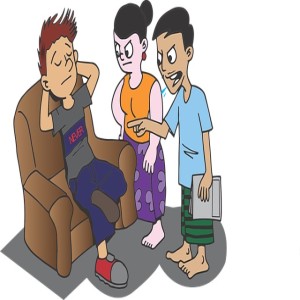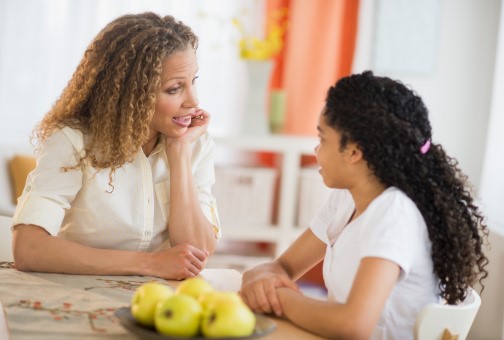Episodes

Monday Feb 17, 2020
Helping Your Child Thru Transitions
Monday Feb 17, 2020
Monday Feb 17, 2020
Normal daily transitions for all of us include asleep/awake, to/from work or school, coming home, day/night activities, and awake/asleep. These and other unusual or specific transitions all can give us pause, if not trouble. In particular, children are susceptible to disruption around transition activities, unless you plan and prepare for the transitions ahead of time. Usually, a 5-10 minute transition time is sufficient to help smoothen it out.

Sunday Feb 09, 2020
Number 1 of Top 10 Parenting Tips
Sunday Feb 09, 2020
Sunday Feb 09, 2020
Start where your child is. That's tip number 1 of my top 10. Your child's words and actions will give you a hint as to where he is emotionally at the time. As best you can, let him be and give him time. Make observations and offer to be his sounding board. Active listen when you get his permission, but don't try to change him. Help him figure it out for himself. Help him understand the impact of his words and actions on himself and on others. Help him be mindful. Being present where he is forms the foundation of a healthy parenting relationship.

Wednesday Feb 05, 2020
Top Ten Helpful Hints for Successful Parenting
Wednesday Feb 05, 2020
Wednesday Feb 05, 2020
I know you really want to do your best at this parenting thing. With all the distractions, confusion, and mixed messages, successful parenting can be hard. As a quick reference, and to make it a bit easier, consider my top ten helpful hints for successful parenting. These helpful hints will both help you put your concerns in context and also lead you to a strong, relational bond with your children.

Sunday Jan 26, 2020
Be Kind to your Child
Sunday Jan 26, 2020
Sunday Jan 26, 2020
None of us has ever been a parent before we had our first child. Parenting is often doing the best you can in sometimes difficult, trying times. While you do have to set limits, give direction, and follow through on consequences, it also helps to "catch them being good." What does that mean? Well, it's a kindness thing. Kindness comes in three forms: focus on being positive, practice praise, and demonstrate acts of kindness, especially when least expected. Not only are you parenting with kindness, you are also modeling for your children how to be kind to others. That teachable moment is quite a gift.

Sunday Jan 19, 2020
Ahh, That New Bundle of Joy
Sunday Jan 19, 2020
Sunday Jan 19, 2020
First newborn baby? Can we say equal parts of joy, love, and terror? How do we do this parenting thing. Most new parents determine to parent just like their parents or, (where there were bad experiences), just opposite of their parents. In any case, it's a new experience for you. So, be physically present. Cuddle lots, coo, tickle, play peek-a-boo. Also, be aware of how your new baby talks to you. Babies have different cries, you know. There's the I'm poopy cry, the I'm hungry cry, the I want your attention cry, and, of course, the I'm just messing with you cry. Learn to interpret their cries, and expand their world with new things and with new curiosities. You baby will truly be a bundle of joy.

Friday Jan 17, 2020
You Cannot Not Communicate
Friday Jan 17, 2020
Friday Jan 17, 2020
Are you in relationship with your children? Of course you are. Then you are communicating 24/7/365. It is physically impossible to not communicate. Soothing, explaining, directing, stony silent, staring. All forms of communication. Chapter 1 of my book, Teachable Moments: Building Blocks of Christian Parenting, is entitled, "Communication Is Relationship." Whether you are using verbal or nonverbal communication, you are communicating with your children. How you say things is just as important as what you say. And guess what. Your children are always watching you and modelling your behavior. Given that you cannot not communicate with your children, be careful what you say and do. Your relationship with them depends on it.

Wednesday Jan 15, 2020
Dare to be Different in Active Listening
Wednesday Jan 15, 2020
Wednesday Jan 15, 2020
When our kids are hurting, you want to active listen their feelings. However, if you start every response with, "You feel..." soon your child will tune out, even if you are helping. So, dare to be different in active listening. Mix it up. Stay current with what you think he is feeling. Keep eye contact and throw in a few encouraging comments like, "Wow", "I think I see," and "Tell me more." Variety will help your child stay connected with you in his pain, letting him know that you really want to understand and to help him address his pain.

Monday Jan 13, 2020
Kids Will Always Test the Limits
Monday Jan 13, 2020
Monday Jan 13, 2020
For kids, testing the limits is a developmental imperative. Why? They do so to help define their boundaries. Without limits, kids would be perpetually anxious and fearful. Boundaries and limit-setting by us parents give them the calm and security to function in the world. If your boundaries are fluid, she will try to take advantage of that. Fluid boundaries can lead to a sense of entitlement, where she believes she can do what she wants, whenever, with no consequence. Boundaries set responsible expectations on your child's behavior and helps them navigate the world better. When your child tests your limits, firmly set them with reward and consequence, finding yet another teachable moment

Saturday Jan 11, 2020
What You Say to Your Child Matters!
Saturday Jan 11, 2020
Saturday Jan 11, 2020
Our kids are always paying attention to us, even when they seem not to be. When they have issues, you want to pay better attention. Empathy is a passive, "I understand what you are feeling" kind of message that my not get through. Active listening is more precise. "Wow! You sound like you feel awful right now." Active listening is your go-to response whenever you child is upset. Be there for her. Don't problem solve, don't criticize, don't minimize what she is feeling. She is hurting, and your active listening is the balm that soothes the pain she is feeling and helps her work through it.

Sunday Dec 15, 2019
Maintaining Healthy Relationships
Sunday Dec 15, 2019
Sunday Dec 15, 2019
You can visually see what a healthy relationship looks like by imagining a transparent, Plexiglas pyramid. The pyramid shows levels of your relationships, starting with your relationship with God, above the apex of your pyramid. Extending downward are levels with your spouse, children, extended family, coworkers and acquaintances, and strangers. The quality of each relationship is related to how well the relationship above it fares. As you are able to best take care of your own needs and feelings, you put yourself in the position to bless others with agape, or unconditional, love. That's the stuff of which teachable moments are made.

